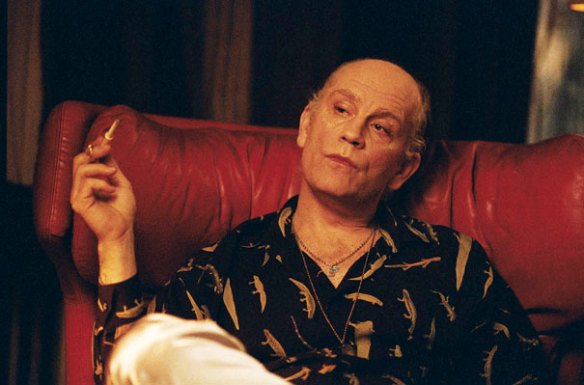(2019) LGBT Drama (Breaking Glass) Oded Leopold, Udi Persi, Ruti Asarsai, Dan Mor, Tamir Ginsburg, Lint Balaban, Ofek Aharony, Or Asher, Keren Tzur. Directed by Yuval Hadadi
Reaching middle age can be a terrifying proposition. Our entire worldview has to change. No longer are we young and indestructible; we are reaching a point in our lives where we have to take stock and prepare for the future rather than live in the moment. Even though 40 isn’t what it used to be, it still has great psychological significance for most of us.
Yoav (Leopold) has reached and surpassed that milestone. In fact, he’s 42 and outwardly, at least, he seems to have things figured out. A successful architect with a beautiful apartment in Tel Aviv that he shares with his partner of 15 years, Dan (Persi) who is a lawyer. They lack for nothing. They are surrounded by friends. Life is sweet indeed.
Yoav’s best friend since childhood is Alma (Asarsai) who has continued that relationship into adulthood. She is an artist and at the opening of a gallery show for her art, she makes the surprise announcement that she is pregnant. The news floors Yoav; as her best friend, he is offended that he wasn’t the first to know.
Even worse from Yoav’s point of view is that Dan is now thinking of fatherhood for himself and that is something Yoav emphatically doesn’t want. His mother has been dead for a while and his father is dying in a nursing home which Yoav refuses to visit; when on the phone with a representative there, he coldly tells them “Then let him die without seeing me.” That’s just the beginning of a downward spiral for Yoav who begins to resent Alma for her life change and Dan as well for wanting one. Yoav is pushing the two people closest to him away as hard as he can; when his firm loses an important project, the stress is clearly beginning to show. But what’s behind Yoav’s sudden change into jerkhood?
Well, to be honest, we never really find out for sure. Hadadi, who also wrote the film, drops cryptic hints; clearly his relationship with his parents is strained – one wonders if they never accepted their son’s sexuality, but Yoav is convinced he’d make a lousy father whereas Dan is just as sure that Yoav would make an excellent dad.
Yoav is at the center of the film and his relationships with Dan and Alma are the movie’s heart; the relationships are thankfully believable; both Alma and Dan are legitimately hurt by Yoav’s actions which he is unable to adequately explain. When questioned about why he’s behaving this way during a crucial scene, he keeps on repeating petulantly “I don’t know!” which gets tedious but then, I think that’s the point.
Hadadi does a great job to create a character who is unpleasant and barely likable; we get occasional glimpses of a different side to Yoav but mainly we begin to get tired of the man’s self-centered narcissism. Yoav has become so in tune with his own needs that he has ceased giving any thought to anyone else’s. He resents Alma because the change in her life is going to affect him. He resents Dan because he has a life goal that is different than his own. We are left to suss out the reasons for the behavior but at a certain point, we just don’t care. A dick is a dick is a dick, as they say.
The relationship between Dan and Yoav is actually pretty realistic; we don’t often get representations of successful gay men in long-term relationships and even though the one depicted here is crumbling, it certainly doesn’t reflect badly on Dan who is bewildered at his love’s behavior and beyond hurt. Eventually the two split up but it is clear that Dan is very much in love with Yoav. Whether Yoav is in love with anyone besides Yoav is a revelation I’ll save for your viewing – can’t leave too many spoilers, right?
Kudos to Hadadi for portraying gay men with depth and even, in the case of Dan, compassion. I also very much admire that Hadadi never wastes a moment; each scene portrays what it needs to and the n Hadadi moves on to the next one. While there might be a couple of sex scenes that may have been a little bit extraneous, Hadadi also reminds us that not every sexual encounter goes the same way. There are different rhythms, different contexts.
I think if we saw a bit more of what Dan saw in Yoav in the first place the movie would have been more powerful. Nonetheless, this is one of the most powerful pieces of LGBT cinema that I’ve seen in quite a while and it is well worth seeking out if you enjoy the genre or better still, if you just like damn good movies.
REASONS TO SEE: Hadadi wastes no time; every scene is efficiently composed and only precisely as long as they need to be.
REASONS TO AVOID: Yoav is so unlikable that after awhile audiences may not be able to identify with him.
FAMILY VALUES: There is sexuality and some profanity.
TRIVIAL PURSUIT: The film has to date won three Best Narrative Feature awards at three different Film Festivals, including the Chicago Gay and Lesbian International Film Festival.
BEYOND THE THEATERS: Amazon, Vudu
CRITICAL MASS: As of 4/28/20: Rotten Tomatoes: No score yet, Metacritic: No score yet
COMPARISON SHOPPING: Junebug
FINAL RATING: 7.5/10
NEXT: Until the Birds Return



